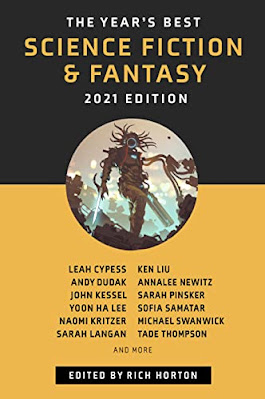.
I'm in virtual print again! Rich Horton's annual selection of the year's best science fiction and fantasy, appropriately titled The Year's Best Science Fiction & Fantasy is now available for purchase.
This is, appropriately enough, the 13th volume in the series. Which is to say, it's cursed. Largely because of the secondary effects of Covid, it came out a year late. (All the stories were published in 2020) and in ebook format only.
That's the bad news. The good news is that the volume contains 35 stories by both new and established writers. All of which bear Rich's imprimatur as being among the best fiction published that year. Which makes it a real bargain at ten bucks.
Highly recommended. Especially my story. I liked it so much I spent years writing it. New writers take note: Don't throw away your unfinished work. The day is coming when you'll be a good enough writer to wrangle it into publishable form.
You can find the table of contents here.
And you may well ask . . .
Did I really spend years writing "The Dragon Slayer"?
Yes, I did. The first sentence just came to me. I wrote it down and then the next one and before I knew it, I was down to the bottom of the page. Just as Olav set foot on the road one morning, with no particular purpose, and found himself in a faraway land in that same stretch of page.
And then? I had no idea. So I had to stop writing.
Off and on for years I tried to get the story going again. I even tried collaborating on it with a friend. Nothing much happened. I did manage to add a few pages of Olav's adventures. But it wasn't until I realized that the story wasn't really about him that I was able to slowly, painfully write the rest of the tale and bring it to a safe ending.
But to find out that ending, you're simply going to have to read the book...
*





